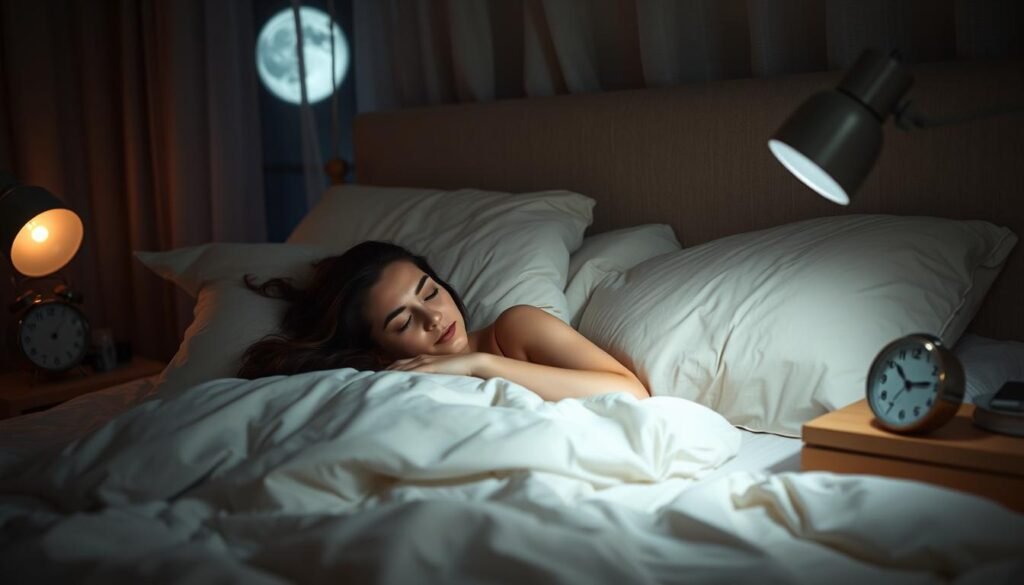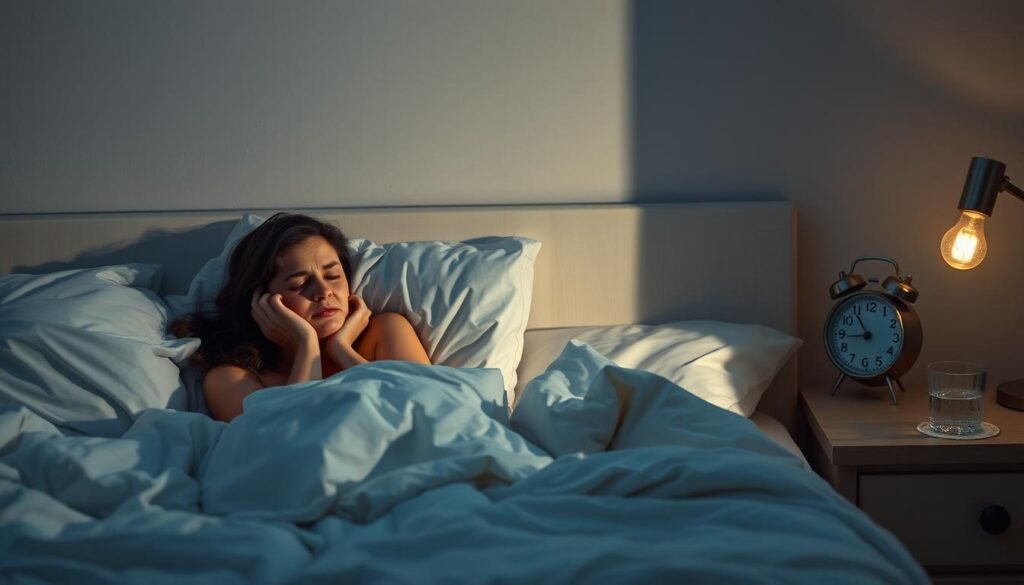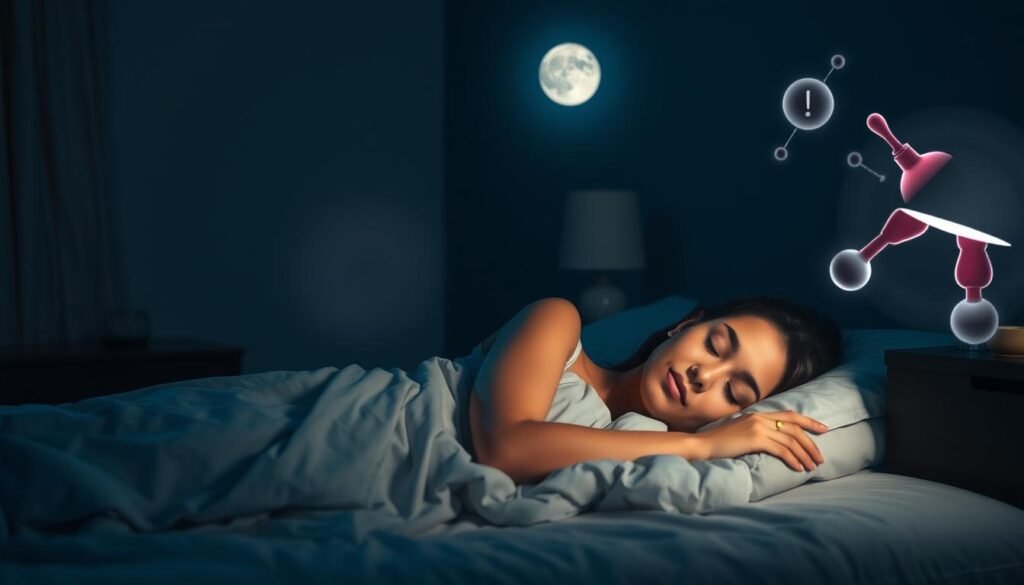About 60% of women going through menopause face insomnia. This shows a clear link between menopause symptoms and sleep problems. This period can bring more than just hot flashes and mood changes. Knowing if insomnia is part of menopause is important. It greatly impacts health and life quality.
Studies show women might wake up before a hot flash. This makes good sleep hard. Insomnia in menopause isn’t just a short issue. It can cause long-term health problems if not handled. Learning how hormone changes affect sleep is key for health during menopause.
There are ways to sleep better. These include good bedtime habits and getting medical advice when needed. Knowing about these problems helps women improve their sleep and well-being.
Key Takeaways
- Up to 60% of individuals in menopause report insomnia.
- Hot flashes can trigger sleep disturbances, making restful nights challenging.
- Regular exercise is beneficial for sleep quality during menopause.
- Hormone replacement therapies may provide some help in managing sleep issues.
- Maintaining consistent sleep habits is crucial for regulating sleep patterns.
- Professional help is advisable if sleep problems persist or worsen.
- Alternative therapies like acupuncture potentially aid in improving sleep quality.
Understanding Menopause and Its Symptoms
Menopause is when a woman stops having periods, usually in her late 40s to early 50s. It happens one year after her last period. Understanding menopause is important. It helps to know what symptoms to expect during this time.
Definition of Menopause
Menopause means a woman’s periods stop because of lower hormone levels. It’s a natural part of aging. But it can bring physical and emotional changes that affect daily life.
Common Symptoms Associated with Menopause
During menopause, women might feel physical and mental changes. Common symptoms include:
- Hot flashes: Sudden feelings of warmth, often with sweating.
- Mood swings: Quick changes in mood, like getting irritable or anxious.
- Sleep disturbances: Trouble sleeping well at night.
- Vaginal dryness: Less moisture, causing discomfort during sex.
- Memory problems: Hard time focusing or remembering things.
Many women find menopause tough, says the National Institute on Aging. Sleep issues are a big complaint, next to hot flashes. Around 40% to 60% of women have trouble sleeping during menopause. Research shows that sleep problems get worse as women get closer to menopause. More than half might also have sleep apnea or restless legs syndrome.
| Menopause Symptoms | Prevalence (%) |
|---|---|
| Hot Flashes | 73% |
| Mood Swings | 65% |
| Sleep Disturbances | 40-60% |
| Vaginal Dryness | 50% |
| Memory Problems | 42% |
Knowing about menopause and its symptoms is powerful. It helps women find the right support and lifestyle changes. Being aware makes managing menopause’s challenges easier. And it leads to better health and well-being.
What is Insomnia?
Insomnia is a sleep disorder that makes it hard to fall asleep or stay asleep. It comes in different forms and affects health and daily life. Learning about the types of insomnia is very important, especially for women dealing with menopause.
Types of Insomnia
There are mainly two types of insomnia: chronic and short-term. Chronic insomnia disrupts sleep for a month or more, affecting daily life. On the other hand, short-term insomnia usually lasts a few weeks, caused by stress or big life changes. Often, insomnia during menopause is related to hormone changes, showing how is insomnia part of menopause.
Incidence of Insomnia Among Women in Menopause
About 46% of people struggle with sleep during the menopause transition. As menopause continues, half of the women face sleep disorders. Problems like night sweats make it worse. Surprisingly, 26% of women in perimenopause and menopause have insomnia that disrupts their daily life.
Several reasons, like mental health issues, play a role in this high incidence of insomnia. Conditions like anxiety, depression, sleep apnea, and restless legs syndrome are more common during menopause. They make sleeping well harder.

| Lifecycle Stage | Insomnia Prevalence |
|---|---|
| Premenopause | 16–42% |
| Perimenopause | 39–47% |
| Postmenopause | 35–60% |
Knowing this, it’s crucial for women with sleep problems during menopause to find the right help and treatments for them.
Is Insomnia Part of Menopause?
Menopause brings many changes, notably in how well you sleep. Studies show a clear link between menopause and sleep problems, leading to more insomnia. Hot flashes and night sweats are big reasons women struggle to get a good night’s sleep.
The Connection Between Menopause and Sleep Disruptions
Hormonal changes during menopause can really mess with your sleep. Hot flashes might wake you up at night, feeling too hot and uncomfortable. In fact, 40% to 60% of people going through menopause say they have trouble sleeping.
Women dealing with insomnia often sleep around 43.5 minutes less than others. They also tend to wake up a lot after initially falling asleep. This shows just how much insomnia can impact sleep during menopause.
Statistics on Insomnia During Menopause
Seeing the numbers helps us understand insomnia’s impact better during menopause. Here are the stats:
| Statistic | Value |
|---|---|
| Women experiencing disturbed sleep and insomnia | 40–60% |
| Average sleep time loss for women with insomnia | 43.5 minutes |
| Women with less than 6 hours of sleep | Nearly 50% |
| Perimenopausal women with significant distress from sleep issues | 26% |
| Future projection of women over 50 by 2030 | 1.2 billion |
These stats show we need to find better ways to help with sleep disturbances during menopause. The high rate of insomnia doesn’t just make you tired. It can also hurt your overall health. Women going through menopause need solutions to sleep better and tackle these symptoms head-on.

The Role of Hormonal Changes in Sleep Disturbances
Hormonal shifts deeply affect our sleep, especially during menopause. The drop in estrogen and progesterone leads to sleep issues for many women. It’s key to understand how these changes impact sleep to effectively treat insomnia.
How Hormone Levels Affect Sleep Cycles
Hormonal changes and sleep are closely linked. When estrogen and progesterone levels fall, sleep patterns change. Women going through menopause often have trouble falling and staying asleep. This shows how crucial hormones are for good sleep. Studies show that low hormone levels can prevent deep sleep, which we need to feel rested.
Impact of Estrogen and Progesterone on Sleep Quality
Estrogen and progesterone affect more than just sleep disruptions. Menopausal women may see changes in their REM sleep. Research indicates these hormonal decreases make it harder to fall asleep and increase night awakenings. This highlights the need to look into hormonal shifts and sleep troubles to better overall health.

Common Sleep Disruptors During Menopause
Menopause causes a lot of changes, affecting how well women sleep. Women often talk about sleep problems during this time, mostly due to shifting hormones. It’s important to know what these issues are to help handle them better.
Hot Flashes and Night Sweats
About 75%-85% of women going through menopause have their sleep disturbed by hot flashes. These sudden warm feelings can wake someone up, hurting their sleep. Since 60% of women report sleep issues from hot flashes, it’s clear why many feel tired during menopause.
Mood Swings and Their Effects on Sleep
Mood swings are another big problem affecting sleep for menopausal women. These changes can make anxiety worse and lead to nights without sleep. Often, women may feel depressed or emotionally unstable, raising the chances of getting insomnia during menopause. Surveys show 61% of menopausal women face new episodes of insomnia due to these emotional challenges.
Other Health Issues Related to Menopause and Sleep
Menopause can also bring other health problems that make sleeping hard. For example, sleep apnea is more common now, with postmenopausal women being two to three times more likely to get it than before menopause. Losing hormones like estrogen and progesterone contributes to these sleep issues. Other conditions, like thyroid or mood disorders and heart problems, can also make sleep worse. Understanding these problems is key for managing health during menopause.
For deeper insight, there’s a study available on how menopause affects sleep. It helps to understand how mind and body health interact during this phase for better management.
Lifestyle changes and natural remedies might help some women sleep better, tackling menopause’s root causes. Trying out melatonin supplements could aid in dealing with sleep issues too.
| Disruptor | Percentage Affected | Recommended Action |
|---|---|---|
| Hot Flashes | 75%-85% | Consider HRT or non-hormonal alternatives |
| Insomnia | 61% | Consult a healthcare provider for evaluation |
| Sleep Apnea | Higher in postmenopausal women | Seek diagnosis for sleep assessment |
How to Get a Better Night’s Sleep During Menopause
Getting enough sleep can be hard during menopause. Many things affect how you sleep, so it’s important to find ways to battle menopausal insomnia. By setting up a good sleep routine, keeping your sleep space comfortable, and trying natural sleep aids, your sleep can get much better.
Establishing a Healthy Sleep Routine
Sticking to a schedule helps a lot with sleep. Setting a regular time to go to bed and wake up tells your body it’s time to rest. Making your bedroom peaceful before sleeping is also key. For example, keep your room at a cool 18°C for a comfy sleep. By doing these things, you’ll see a big improvement in how well you sleep.
The Importance of Sleep Hygiene
Good sleep habits are key for handling menopausal insomnia. Try to cut down on screen time before bed because the blue light messes with your sleep. Also, drinking less caffeine and alcohol before bedtime helps keep your sleep deep and restful. These steps will help you sleep better and feel more energized during the day.
Natural Remedies for Sleep Improvement
Turning to natural solutions can help with sleep problems. Valerian root and hops are examples of herbs that might help you sleep. Cognitive behavioral therapy (CBTi) can also be a big help for some. Stay active and try mindfulness to boost your sleep quality. For severe symptoms, a doctor might suggest hormone replacement therapy (HRT), which helps many with sleep issues.
| Strategy | Description | Benefit |
|---|---|---|
| Consistent Sleep Schedule | Go to bed and wake up at the same time daily. | Regulates the body’s internal clock. |
| Cool Bedroom Temperature | Maintain a room temperature around 18°C. | Promotes comfort and reduces night sweats. |
| Healthy Pre-Sleep Routine | Engage in calming activities before bedtime. | Helps signal the body to prepare for sleep. |
| Limit Alcohol and Caffeine | Avoid intake close to bedtime. | Reduces disruptions to sleep patterns. |
| Herbal Supplements | Consider options like Valerian root. | May aid in inducing sleep naturally. |
Check out the resource on better sleep during menopause for more tips. Using a mix of these methods can help you enjoy more restful nights and boost your overall health.
Treatments for Managing Menopausal Insomnia
Many women face challenges sleeping during menopause. There are ways to help, including drugs and other methods. These aim to make sleep better and deal with menopause issues.
Medications and Therapies
Some treatments can help with sleep problems. The common ones are:
- Estrogen Replacement Therapy: This can make sleep better and lessen menopause signs.
- Sedative-Hypnotic Agents: Used for a short time due to long-term worries.
- Benzodiazepines: These help with sleep but may not be safe long-term, especially for older people.
- Gabapentin: It improves sleep and reduces other symptoms, being safe for users.
- Serotonin Reuptake Inhibitors: They can help by easing anxiety and making sleep better.
These options help right away, but their long-term use can be risky. It’s key to use them safely with a doctor’s watch.
Behavioral Strategies for Better Sleep
Cognitive behavioral therapy for insomnia is a good choice without drugs. It changes the thoughts and actions that affect sleep. This method works well for women going through menopause, especially if they have hot flashes or mood changes.
Good habits can also help:
- Keeping the same sleep time each night.
- Having a relaxing routine before bed.
- Staying away from screens before sleeping.
- Using relaxation methods to calm stress and anxiety.
For serious insomnia, getting help from a program led by experts is best. Working with therapists who know about women’s health can make sleep much better.
Seeking Professional Help for Sleep Issues
Many women with sleep issues during menopause think about getting professional help. This step is crucial in tackling the sleep problems linked to menopause. Talking to a healthcare provider early can help manage symptoms and address any hidden issues.
When to Consult a Doctor
Knowing when to get medical advice is key. Women should see a doctor if:
- They have had trouble sleeping for over a month even after trying to fix it themselves.
- They feel very tired during the day, and it’s affecting their daily life.
- They show signs of sleep apnea, like loud snoring or stopping breathing while asleep.
- Sleep troubles are causing them a lot of stress or affecting their happiness.
It’s important to see a doctor when sleep issues are too much to handle or if there are worries about other health problems. This is the first move towards finding help and getting better.
Possible Diagnostic Procedures and Solutions
A doctor’s visit might include a deep dive into your health history. This could shine a light on possible causes of sleep issues, such as your lifestyle, mental health, or medicines you take. Sleep studies might also be done to check how you sleep and see if you have sleep apnea or other sleep troubles.
- Therapies like cognitive behavioral therapy could be suggested, as they are often helpful for menopause-related insomnia.
HRT might be an option too. It can make you feel better overall and help with menopause-related sleep problems. Finding other unrelated disorders is vital. Working together on treatment can bring good results.
Conclusion
The journey through menopause often brings different challenges. One key issue is sleep disturbances. It’s clear that menopause and insomnia are closely linked. Studies indicate that 40% to 60% of women going through menopause have sleep problems. These issues arise from hormonal changes and symptoms like hot flashes. Thus, handling sleep issues is crucial for well-being during menopause.
It’s important to understand how hormonal changes and mood disorders interact. Recent studies underscore the value of a thorough clinical assessment. This can guide the choice of specific treatments for affected women. Options like cognitive behavioral therapy and medication can make a big difference. They improve sleep habits and boost how well someone functions during the day.
A significant number of women, 26%, struggle with severe insomnia during menopause. It’s vital to address these problems. Regular check-ins with healthcare providers can offer crucial support and the right interventions. This ensures women get the rest they need and stay healthy after menopause. For a deeper look into this issue, click here to read a comprehensive study. Making sleep a priority during this time is key to a healthier, happier life ahead.